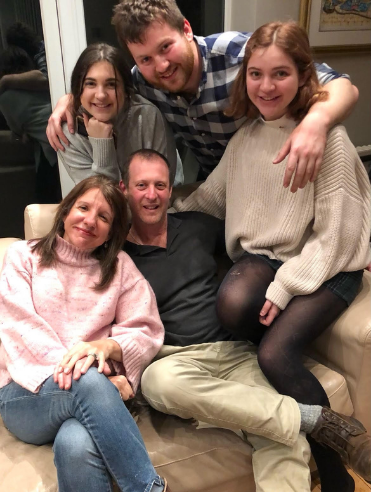

Meet the Wolf/Weiss-Wolf family—Alan, Jennifer, Nathaniel, Rebecca and Sarah. Jennifer Weiss-Wolf is a lawyer, writer, advocate, and the new Executive Director of Partnerships and Strategy at Ms. Magazine. In honor of Women’s History Month, we wanted to ask about her work surrounding menstrual equality and feminism.
How did you get involved in menstrual health education and activism?
It is an entirely TSTI story! In early 2015, Elise Joy and her daughters had just kicked off their Girls Helping Girls. Period. project; I learned about it on Facebook. Elise and I met up, and I was immediately inspired. Because of my background as a lawyer and policy wonk – I’ve worked at the Brennan Center for Justice at NYU Law for the past 12 years – I found myself drawn to the pursuit of systemic solutions to address menstrual access. I began researching and writing about ways government could engage, which led me to bring the issue to the New York City Council. By 2016, the city passed the first slate of laws in the world to mandate menstrual product provision by public agencies. I’ve since worked with political leaders across the country and around the globe to advance the same; written op-eds and contributed to reporting for major news outlets; and wrote a book about it in 2017, Periods Gone Public: Taking a Stand for Menstrual Equity. I’m working on a new book now, giving the same political and policy consideration to another taboo “M” word – menopause. (That book will come out in 2024, so stay tuned!)
What does menstrual equality mean?
Early on, I became aware of various global efforts underway to address menstruation – some of which centered water, sanitation, and hygiene interventions; others focused on public health; and still others elevated human rights principles. Those are all very powerful frameworks – and yet I suspected would not be effective in driving U.S. lawmaking. I chose to use the frame and phrase “menstrual equity” to appeal to legislators on both sides of the aisle. (It worked, too – there are as many “red states” as “blue states” that have passed these laws.) To me, the definition of “menstrual equity” is this: We will not achieve a fully equitable society if menstruation – and the lack of safe, affordable products, in particular – keeps anyone from participating fully, whether that be in their education, in the economy, and/or in civic life.
What does it mean to be a feminist in 2022?
I’ve been a feminist for my whole life, all 54 years of it! And it means the same thing to me now, in 2022, as it did when I was a kid in the 1970s. I believe unequivocally in the power of girls and women – of our voices, our perspectives, our experiences. But feminism is not merely about the ascent of women. It is an inclusive ideology and ideal – a demand to reimagine and redesign societal structures and systems, including perceptions of gender, that can marginalize and oppress and limit us all.
How have you tried to pass your views and activism onto your children?
I’ve got three children – all of whom have been TSTI students/congregants and are now independent young adults. All of them are active in the pursuit of justice, committed to improving the world around them. I can’t say it was a conscious effort on my (or my husband’s) part, but an inevitable byproduct of being raised in Maplewood-South Orange and as part of the broader reform Judaism community.
How has being Jewish influenced your feminism and activism?
I do think that my commitment to service – combined with my constant need for dialogue and discourse and debate – is squarely rooted in Jewish life. Not surprisingly, I find a lot of commitment among Jewish organizations to the issue of menstrual equity – across the country and around the world. One of the favorite interviews I’ve done was this time last year for International Women’s Day – a Times of Israel podcast with a Jerusalem-based host and reporter. We had an immediate kinship, a shared set of values and sense of humor (and even the same breathless, rapid communication style!). Please have a listen – I think TSTI members will relate and enjoy!
In your new role at Ms. Magazine, how do you hope to influence new generations of young women?
I am beyond excited to take on a new role this year – at the iconic feminist publication, Ms. magazine, as executive director leading partnerships and strategy. As a GenX-er who first discovered Ms. in my school library circa 1979, it is a rather extraordinary and fateful feeling! Among the projects I am most excited about, I’ve spearheaded a new “Women and Democracy” multimedia platform at Ms. – to mark key milestones for the ERA, offer new vision for abortion jurisprudence, and analyze women’s voting power, etc. Since Ms. is based in Los Angeles, I’ll continue to make the Brennan Center and NYU my home base – where I am staying on as a fellow, doing more public writing and engagement on the intersections of gender equity and what it takes to protect and reform American democracy.
I hope that this work inspires young people to connect the dots on issues that seem unconventional or even odd – and to make the case that a healthy democracy requires us to shine a light on silent inequities that can hold folks back. As I am prone to say in the menstrual equity context: “We all do better when we ALL do better.”
Want to make a difference in menstrual inequality? Check out Girls Helping Girls. Period. for more information.

